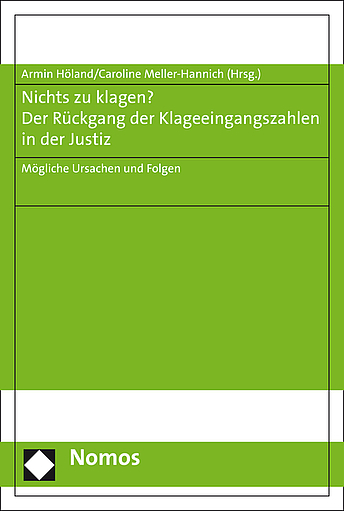englischAfter decades of heavy and increasing workloads for German courts, recent years have seen a reversal in this trend. The number of cases brought in all five jurisdictions has begun to fall, including the social courts, which initially experienced a marked rise in activity after 2005. What might explain this? Are there now fewer legal problems, or have the courts been supplanted as the means to resolve them? Are consumer complaints now resolved internally by firms and service providers? Will the evaluation of service quality move away from juridical categories to points-based systems and reviews in a digitalised form of social control? Is the recent trend ascribable to the improved economic and employment situation? Is the German justice system not working effectively? Has there been a fundamental shift in legal awareness? Or does the trend reflect an increase in the provision of alternative means for settling disputes? And, finally, have there been changes in the scope offered by substantive law? Even though, as yet, no definitive explanation is on offer, individual observations might provide a path to a fuller understanding. The contributions to a symposium held at the University of Halle in December 2015 present an interesting range of both observations and evaluations drawing on experience in courts, extra-judicial settlement bodies and from empirical legal research.
With contributions by:
Nach Jahrzehnten starker Inanspruchnahme der Justiz in Deutschland lässt sich eine Umkehrung der Entwicklung feststellen: Über alle Gerichtsbarkeiten hinweg wird weniger geklagt. Die Zahlen der Klageeingänge sinken mittlerweile selbst in der Sozialgerichtsbarkeit, die ab 2005 einen steilen Aufschwung erfahren hatte. Welche Ursachen hat das? Weniger Rechtsprobleme oder andere Formen der Bearbeitung? Werden Probleme inzwischen bei Kundenbeschwerdestellen gelöst? Wird die Qualität von Leistungen nicht länger durch rechtliche Kategorien evaluiert, sondern durch Punktesysteme und Bewertungen, eine digitale Form sozialer Kontrolle? Liegt es an der guten wirtschaftlichen Konjunktur? Arbeitet die deutsche Justiz nicht effizient genug? Gibt es einen Wandel im Rechtsbewusstsein? Ist die Konkurrenz der alternativen Streitbeilegung zu groß? Sind es Änderungen im materiellen Recht? Allgemeingültige Erklärungen gibt es bislang nicht. Aber auch aus einzelnen Beobachtungen kann Erkenntnis erwachsen. Die Beiträge auf einem im Dezember 2015 an der Universität Halle veranstalteten Symposium zu diesem Thema bieten weiterführende Beobachtungen und Deutungen aus der Gerichts- und Schlichtungspraxis und aus der empirischen Rechtsforschung.
Mit Beiträgen von:
• Armin Höland und Caroline Meller-Hannich, Rückgang der Klageeingangszahlen – wo liegt das Problem?
• Winfried Schubert, Gehen der Justiz in Deutschland die Zivilverfahren aus? Fakten, Überlegungen, Maßnahmen insbesondere mit Bezug zu Sachsen-Anhalt;
• Monika Nöhre, Erfahrungen mit Streitverhalten und Streitbeilegung aus Justiz und Schlichtung;
• Eberhard Natter, Die Arbeitsgerichtsbarkeit Baden-Württemberg im Wechsel der Konjunkturzyklen;
• Michael Moeskes, Entscheidung und Schlichtung im Verwaltungsrecht;
• Holger Scheiding, Streitverhalten und Streitbeilegung in der Wirtschaft: Erfahrungen aus der Sicht des Handwerks;
• Kerstin Kols, Streitverhalten und Streitbeilegung im Bereich der Arzthaftung in Deutschland aus Sicht der Schlichtungsstelle für Arzthaftpflichtfragen der norddeutschen Ärztekammern;
• Hubert Rottleuthner, Prozessflut und Prozessebbe – Fragen und Forschungsbedarf;
• Bernd Hirtz, Die Zukunft des Zivilprozesses;
• Reinhard Greger, Postkutsche auf der Autobahn – Ist der Zivilprozess noch zeitgemäß?


